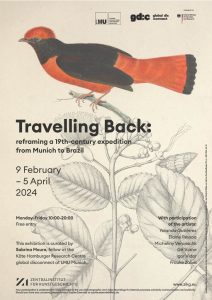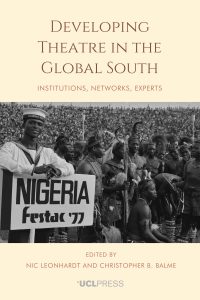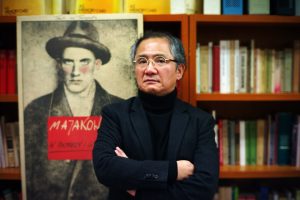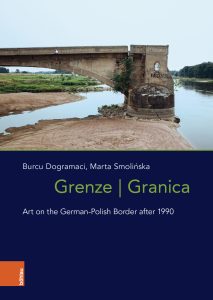CfP: Fotogeschäfte

In 2025/26, a special issue of the journal „Fotogeschichte. Beiträge zur Geschichte und Ästhetik der Fotografie“ (www.fotogeschichte.info) will be dedicated to photo shops
from a global perspective. With this issue, the editors are contributing to a new field of research: the infrastructures of photography. Infrastructurally speaking, photoshops
are essential to supporting and supplying photographic practice and important to the distribution of images. They are closely linked to the history of photographic technology.
From the end of the 19th century, amateurs increasingly entered the market thanks to the introduction of new cameras, which in turn increased the demand for facilities. Photo shops sold material vital to producing photographs, such as film, cameras and spare parts, and they would develop the exposed film. Photographic prints then found their way into private or the public contexts along various routes: they were shown to family and friends, collected in albums, distributed through the press and institutional collections, displayed in exhibitions and circulated as postcards. In addition, passport photo production remains another service photo shops provide to this day. The photo shop was/is, therefore, also a place migrants find themselves before or soon after their arrival to obtain the photos they need for their documents. Camera bags in the estates of exiled photographers scattered around the world also indicate the significance of shops, photo services and laboratories to migrants. Indeed, some shops were also run by exiles and migrants. Moreover, photo shops were also an important way to make a living, as well as being part of social interactions and places that fostered encounters. Even today, photo shops with Turkish names in the Bahnhofsviertel near the main station in Munich and in the Kreuzberg district of Berlin, for example, testify to the infrastructural practice of finally arriving professionally in a destination country. The infrastructures of photography are thus closely linked to the history of exile and migration. Photo shops are also part of a (post-)imperial and (post-)colonial history. When analysing photo shops around the globe, questions arise about power relations and the interdependencies between migration, displacement and colonial contexts. To what extent can photo shops be placed within the multi-ethnic imperial societies such as the Ottoman Empire, the Russian Empire and the Austro-Hungarian Empire? How can colonial and imperial photo histories be told through changing ownership and customers? We welcome contributions on the following topics and others: - Photo shops from transnational, transcultural and global perspectives - Photo shops and migration - (Post-)imperial and (post-)colonial contexts of photo shops - Actors in photo shops - History of technology and theory of photographic infrastructures Essays of approximately 25,000 characters and should be submitted by 15 January 2025. Please send an abstract (max. 2,000 characters) and a short CV in a single pdf by 1 September 2024 to burcu.dogramaci@lmu.de and helene.roth@lmu.de.
Continue Reading





 A warm welcome to our new fellow Elisabeth Leake who joins global dis:connect in early July.
Elisabeth Leake is the Lee E. Dirks Chair in Diplomatic History at the Fletcher School of Law and Diplomacy, Tufts University. She works on decolonisation, the global Cold War and histories of South Asia.
Her project at gd:c, Decolonization’s Discontents: Dissent and Opposition in the Aftermath of Independence, explores the development of different modes of opposition in the aftermath of political independence.
A warm welcome to our new fellow Elisabeth Leake who joins global dis:connect in early July.
Elisabeth Leake is the Lee E. Dirks Chair in Diplomatic History at the Fletcher School of Law and Diplomacy, Tufts University. She works on decolonisation, the global Cold War and histories of South Asia.
Her project at gd:c, Decolonization’s Discontents: Dissent and Opposition in the Aftermath of Independence, explores the development of different modes of opposition in the aftermath of political independence.
 In June Claiton Marcio da Silva commenced his term as a fellow at global dis:connect. Welcome.
Claiton Marcio da Silva is an associate professor of history at the Universidade Federal da Fronteira Sul (UFFS), Brazil, with a PhD in the history of science.
At global dis:connect, Claiton Marcio Is exploring soybean production and exports as a fundamental dis:connectivity in globalisation, with a focus on political and socioenvironmental aspects.
In June Claiton Marcio da Silva commenced his term as a fellow at global dis:connect. Welcome.
Claiton Marcio da Silva is an associate professor of history at the Universidade Federal da Fronteira Sul (UFFS), Brazil, with a PhD in the history of science.
At global dis:connect, Claiton Marcio Is exploring soybean production and exports as a fundamental dis:connectivity in globalisation, with a focus on political and socioenvironmental aspects.  In early July, Shane Boyle joins global dis:connect as a new fellow. Welcome to Munich, Shane!
Shane Boyle is a senior lecturer in the School of English and Drama at Queen Mary University of London. His research focuses on logistics, Marxism, and performance history.
At global dis:connect, Shane will write a monograph on how the art world has become entangled in the planetary mine of supply chain capitalism.
In early July, Shane Boyle joins global dis:connect as a new fellow. Welcome to Munich, Shane!
Shane Boyle is a senior lecturer in the School of English and Drama at Queen Mary University of London. His research focuses on logistics, Marxism, and performance history.
At global dis:connect, Shane will write a monograph on how the art world has become entangled in the planetary mine of supply chain capitalism.  In July Philipp W. Stockhammer commenced his term as a fellow at global dis:connect. Welcome.
Philipp W. Stockhammer is a professor of prehistoric archaeology focussing on the Eastern Mediterranean at the LMU Munich and co-director of the Max Planck-Harvard Research Center for the Archaeoscience of the Ancient Mediterranean at the Max Planck Institute for Evolutionary Anthropology in Leipzig.
In his research at gd:c he focuses on the dis:connectivities. He confronts as a (pre-)historian: the transformative power of dis:connectivity in the past and the challenge of narrating the past between othering and nostrification.
In July Philipp W. Stockhammer commenced his term as a fellow at global dis:connect. Welcome.
Philipp W. Stockhammer is a professor of prehistoric archaeology focussing on the Eastern Mediterranean at the LMU Munich and co-director of the Max Planck-Harvard Research Center for the Archaeoscience of the Ancient Mediterranean at the Max Planck Institute for Evolutionary Anthropology in Leipzig.
In his research at gd:c he focuses on the dis:connectivities. He confronts as a (pre-)historian: the transformative power of dis:connectivity in the past and the challenge of narrating the past between othering and nostrification.  Sabrina Moura's
Sabrina Moura's  Developing Theatre in the Global South
Developing Theatre in the Global South In March Jie-Hyun Lim commenced his term as a fellow at global dis:connect. Welcome.
Jie-Hyun Lim holds the CIPSH Chair of Global Easts and is a founding director of the Critical Global Studies Institute at Sogang University.
At gd:c Jie-Hyun will work on multilingual versions of victimhood nationalism as a conceptual tool to illustrate competing memories of victimhood in the postwar Vergangenheitsbewältigung across Europe and East Asia.
In March Jie-Hyun Lim commenced his term as a fellow at global dis:connect. Welcome.
Jie-Hyun Lim holds the CIPSH Chair of Global Easts and is a founding director of the Critical Global Studies Institute at Sogang University.
At gd:c Jie-Hyun will work on multilingual versions of victimhood nationalism as a conceptual tool to illustrate competing memories of victimhood in the postwar Vergangenheitsbewältigung across Europe and East Asia.  Burcu Dogramaci and Marta Smolińska. Grenze|Granica. Art on the German-Polish Border after 1990. Cologne: Böhlau, 2024.
Burcu Dogramaci and Marta Smolińska. Grenze|Granica. Art on the German-Polish Border after 1990. Cologne: Böhlau, 2024.